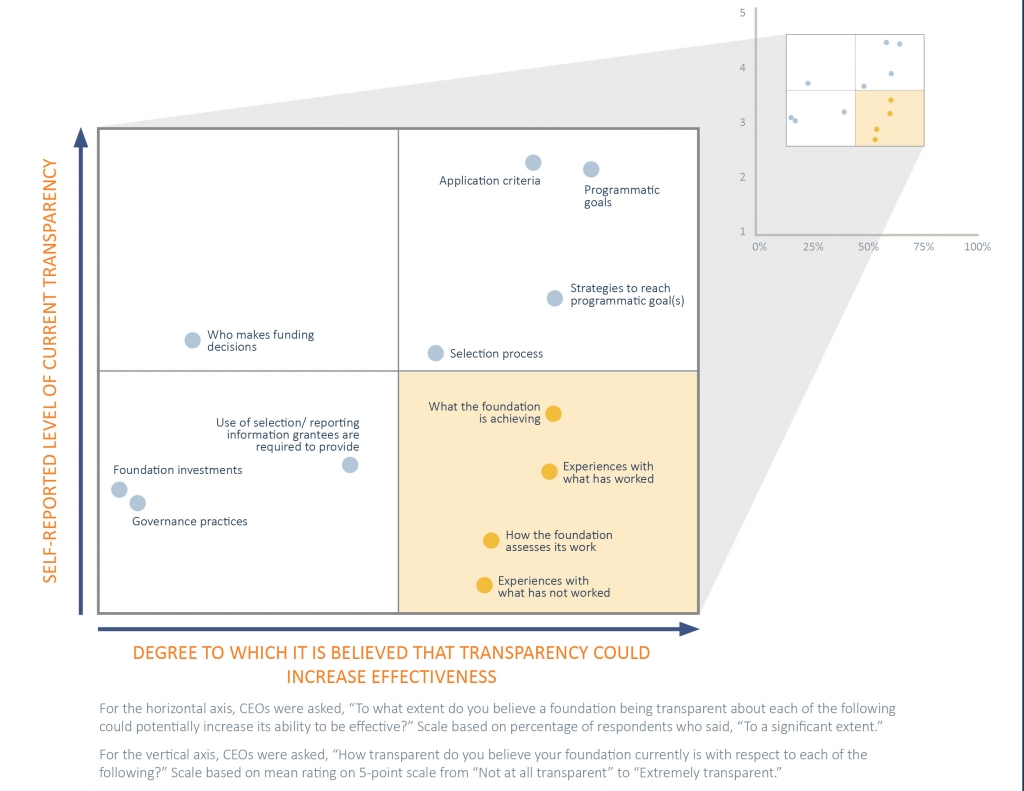Our tagline at Fund for Shared Insight is “Philanthropy. Open for improvement.”*
Founded in July 2014, Fund for Shared Insight (“Shared Insight”) is a funder collaborative working to improve philanthropy by increasing foundation openness. We are betting that if foundations are more open, they will be more effective.
You might wonder what we mean by openness. To Shared Insight, being open means that foundations share their goals and strategies, make decisions and measure progress, listen and engage in dialogue with others, act on what they hear, and share what they themselves have learned.
One of the first grants Shared Insight made was to the Center for Effective Philanthropy (CEP) to conduct research on foundation CEOs and their perspectives about transparency. CEP compiled these findings and released a report this February, entitled Sharing What Matters: Foundation Transparency, to inform the field and our own efforts. A key finding from the report is that while foundations are transparent about their grantmaking processes, goals, and strategies, “foundations are less transparent when it comes to sharing how they assess their performance or their lessons learned, despite their belief that it would be beneficial to do so.” (See Figure 1)
Figure 1

This finding has prompted us at Shared Insight to ask the following question: Will foundations simply sharing more about how they assess their work — and what works and doesn’t work — actually lead to improvements in philanthropy?
Building on our ongoing conversations among the eight Shared Insight core funders and our colleagues at leading philanthropic infrastructure organizations, we believe that sharing, while important, is only one part of the equation for philanthropy to be more effective. In order for philanthropy to improve, foundations need to not only share what they know but also listen to what others — including grantees and the people they seek to help — have to say, and, as appropriate, act on what they learn. Foundations sharing more about what they know is necessary, but on its own is not enough.
Imagine, for example, if more foundations shared information about how they assess their own work and posted their evaluations of what worked and didn’t work on their websites. Would the existence of more documents dramatically improve philanthropic and nonprofit effectiveness? We hypothesize that while there would be some benefits to foundations and grantees from having access to these learnings, the act of sharing alone would likely not lead to better outcomes. Rather, meaningful discussion and dialogue about these learnings, incorporating the voices of beneficiaries, and implementing changes in foundation and nonprofit practice informed by these learnings is ultimately what will improve results.
One of our core values at Shared Insight is to model the openness we want other funders to adopt. Informed by CEP’s research recommendations, we posted an assessment conducted by ORS Impact, our evaluation partner, on our progress against our theory of change during our first 18 months. (To download the full report, please see Fund for Shared Insight: Theory of Change Progress and Lessons.)
A key finding from the ORS Impact assessment is that while we now have 30 foundations supporting the work of Shared Insight, and while we are making progress as hoped in the areas of feedback practice and research, we are not making as much progress in the area of increasing foundation openness. In order to improve on this front, we engaged our Shared Insight colleagues in a series of conversations about how to clarify our goals and strategies for this work. In addition, we met with and emailed half a dozen of our philanthropy infrastructure colleagues to gain their feedback on various iterations of a concept paper on foundation openness.**
The result of all this dialogue is an open request for proposals we announced last week to increase foundation openness in service of effectiveness. We welcome nonprofits to apply for this funding and engage with us in dialogue through participating in our webinars, emailing feedback to melinda@fundforsharedinsight.org, commenting on this blog post, and tweeting your thoughts to @4sharedinsight and @melindatuan. We invite others to dialogue with us as well about our assessment of our progress, our approach to increasing foundation openness, and the new RFP.
We at the Fund for Shared Insight want to share and listen and learn — and we are open for improvement!
Melinda T. Tuan is the project manager for Fund for Shared Insight (“Shared Insight”) and an independent consultant who works with the senior leadership of philanthropic organizations to develop strategies for effective philanthropy. With Shared Insight, Melinda plays a key role in guiding and facilitating activities including operations, communications, grantmaking, and evaluation. Follow her on Twitter at @melindatuan, and follow Shared Insight at @4SharedInsight.
* The tagline “Philanthropy. Open for improvement,” is a triple entendre. Can you decipher the three possible meanings behind the phrase? (Answers below:)
- The Fund for Shared Insight is open for business.
- We as the Fund for Shared Insight aspire to be open in our approach to philanthropy and improve our own philanthropic practice.
- If philanthropy is more open it will improve.
**For more details on how we refined our goals and strategy to increase foundation openness, please stay tuned for our guest blog post on GlassPockets’ Transparency Talk blog the week of April 18th.


